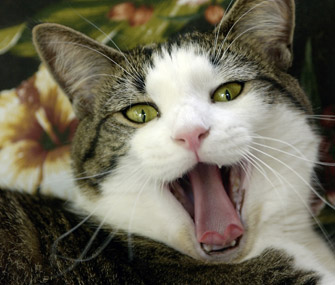Why Does My Cat Smell So Bad?
Published on October 23, 2015
Skip To

If your stomach starts to rise up into your throat every time you get a whiff of your cat, there’s something wrong. Most malodorous cats have some type of health problem that your veterinarian can and should diagnose and treat. To take your cat’s personal scent from funky to fine, see if he has one of the following problems.
Up Front
Does your cat have stinky breath? He may have periodontal disease or stomatitis. By our best estimates, about 70 percent of cats 2 years or older suffer from dental disease, most likely because their teeth never get brushed. And it only gets worse with age.Even worse is a condition called stomatitis: a severe, painful inflammation of a cat’s mouth and gums. Cats with stomatitis develop painful ulcers in the mouth, and bad breath is a common sign of the disease.
Sometimes dental disease isn’t the problem. A cat with breath that smells like urine may be in the early stages of kidney failure. Foul breath may signal digestive tract or liver disease. Bad breath can also be a sign of oral cancer.
No matter what the cause, bad breath in cats needs to be checked out. A professional cleaning, regular home care, medication or treatment for an underlying cause can help to bring his breath back to normal.
Take a whiff of your cat’s ear. If it smells yeasty or foul, especially if there is an accompanying discharge, that’s a good clue that he needs an inspection for infection or other problems.
Feline ear infections can be related to allergies, ear mites, foreign bodies stuck in the ear, skin conditions such as seborrhea, or tumors or polyps in the ear. Depending on the cause, the problem may be treatable with medication — or it may require deep cleaning or even surgery.
The Back End
If your cat’s stink is coming from his rear, the causes could range from feces matted in his fur (most common in long-haired cats) to infected anal glands (rare in cats but possible). Cats with diarrhea or simply a soft stool may have messy rear ends that require trimming or a butt bath. Some cats have difficulty grooming themselves, because they are overweight, arthritic or have some other condition that limits their ability to clean the rear end. Other causes of stinky diarrhea include dietary distress (aka garbage gut), inflammatory bowel disease, intestinal parasites and cancer.Unlike dogs, it’s unusual for cats to develop impacted or infected anal glands, but the sacs can cause problems in other ways. Overactive anal glands can cause cats to emit an unpleasant stink. In other cases, inflammation may close off the opening to the anal gland duct, preventing the sac from emptying normally.
Urine can also smell bad. If you notice a change in the odor of your cat’s urine, he may have an infection or another problem involving the urinary tract or kidneys.
The bottom line? Your veterinarian can help you determine the cause of the problem and recommend a treatment, whether that’s more fiber in the diet, a hypoallergenic food, medication to treat an infection or treatment of an underlying disease. If your cat has difficulty grooming himself, you may need to give him a helping hand or seek the services of a professional groomer.
Bite Wounds
Cats who go outside and get in fights often come home with nasty bites. Those puncture wounds are often invaded by a number of different bacteria including Pasteurella multocida, which make their home in cats’ mouths and get injected into the body from a bite. The resulting infection can cause a painful abscess, a swollen area inside the body containing pus. You might not notice an abscess until it ruptures, but you can sure smell it when it does.Always check your cat for painful areas when he comes in from the outdoors. Abscesses can develop in less than 24 hours.
Signs of an abscess include lethargy, lack of appetite and flinching when touched on the injured area. Be sure to check around the base of the tail, on the legs, around the face or neck, and along the back. Those are the areas where cats are most likely to bite each other. Your veterinarian can treat the abscess (sometimes surgery is necessary) and prescribe antibiotics to treat the infection and medication for the pain.
More on Vetstreet:
- Why Does My Cat… Pee on My Bed?
- 5 Health Problems Cat Owners Overlook
- Solving the Most Common Cat Potty Problems
- Signs Your Cat or Dog Could Have Fall Allergies
- Health Issues You Might Not Realize Your Pet Has

